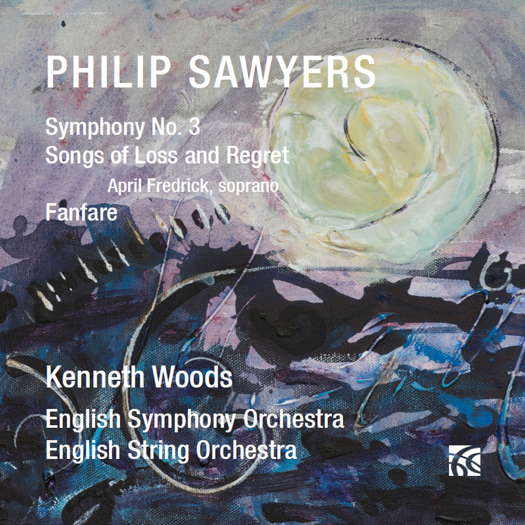- Herbert Fox
- David Angel
- Kairos
- dog
- Bach: Brandenburg Concertos
- Berg: Wozzeck
- Borys Mykolayovych Lyatoshynsky
- Inzegneri
In Many Respects a Success
Longborough Festival Opera's wacky
production of Cavalli's 'La Calisto',
reviewed by RODERIC DUNNETT
Longborough Festival Opera, with its spreading English views across the Vale of Evesham, has earned widespread accolades for its magnificently conducted (by Anthony Negus), intelligently staged productions of Richard Wagner, which have achieved for it, not without reason, the title 'the Cotswold Bayreuth'.
Tristan und Isolde and Tannhäuser have both recently drawn Longborough critical and audience plaudits. Such vast acclaim is fully justified. Its trademark has been a series of Ring cycles, which since their inception in 1998 have merited not just local and national but beyond that, arguably worldwide attention. At Longborough things are always on the move. It launched the present 2019 season with an already hailed new staging of Das Rheingold, initiating a wholly fresh cycle which will grow to a culmination with a full-blown Ring in 2023.
Longborough, which had the initiative to present the UK's only complete Ring cycle in 2013 (the bicentenary of the composer's birth), has from the outset diversified into other repertoire: Mozart, Strauss, Verdi and Janáček - Katya Kabanova and Jenůfa, both recently; The Cunning Little Vixen will feature in 2020. Donizetti has appeared in the mix: Anna Bolena figured this year, Don Pasquale in 2015, and the lighter The Elixir of Love is tacked onto the 2020 season.
What was initially less well-known, but is now supported by knowing audiences as a popular high quality element each season, is Longborough's commitment, due to the initiative of its founding couple Martin and Lizzie Graham, to furnishing enlightened, enabling opportunities for younger singers. Ten operas for young artists - invariably imaginatively produced and very competently - will have matured by 2020, including Monteverdi's L'Incoronazione di Poppea, staged memorably in 2008 and again in 2018. Their Handel has generally been first rate: Rinaldo, Xerxes (wonderful) and Alcina were mounted in three consecutive seasons (2014-16). This youthful enterprise has become not just an add-on, but with its obvious high standards a vital and uplifting feature of Longborough's summer season. The Vixen next year will in fact be a Young Artists production: quite a challenge to pull off, but pure enchantment when it succeeds.
This year it was Francesco Cavalli (1602-76) - thirty-five years younger than Monteverdi, possibly his pupil, and stylistically akin. How much one took to Mathilde Lopéz's pretty wacky staging of La Calisto depended on one's tolerance of Lopéz's in-your-face innovation, one's desire for a traditional mythical staging (as many of Handel's Semele are), one's distaste for the gratuitous, one's dislike of supermarket trolleys, and one's consequent doubts about having shelled out for a ticket. It was pretty over the top, incorporating much visual bric-a-brac that took it to the edge of pointlessness. Not surprisingly, opinions on this slightly twerpish approach were pretty conflicting. Lopéz in fact founded and leads a somewhat avant-garde company in Cardiff, August 012, which may to a degree have influenced her 'innovative' production here. She teaches at the Royal Welsh College of Music and Drama.
Yet despite these production annoyances, I loved it. There is, after all, a good deal of tongue-in-cheek in La Calisto. With the help of his aide-de-camp Mercury (bass), Jupiter (baritone) disguises himself as his daughter Diana - the goddess of abstention and the renunciation of sex: her acolytes prefer to remain virgins - and descends to earth, expressly to have his usual way with a scrumptious nymph, Calisto. Conveniently, his disguised role is depicted by a quite separate figure, 'Diana' (a mezzo). Teenage Calisto in turn - irony of ironies - falls in love with the goddess of her dreams, and seeks 'bouquets of kisses'. The idea of a woman, or girl, falling for another woman is a bit of a Leitmotif in certain Baroque operas, but the irony and explanation here is that, despite 'her' mezzo, Diana is in fact the cross-dressing Jupiter.
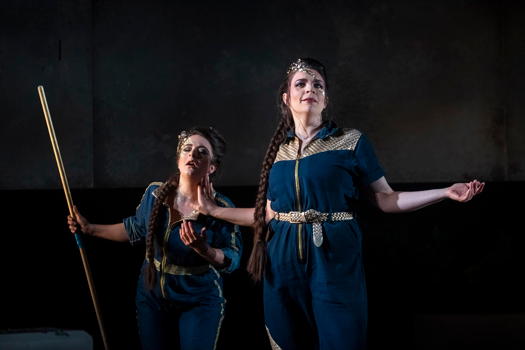
The supposed Goddess Diana, actually the lusting Jupiter in disguise (Sophie Goldrick) with (behind) the amorous Calisto (Chiara Vinci). Photo © 2019 Matthew Williams-Ellis
I suppose one of the first complaints might be that the navy and yellow trouser suits donned by the mock Diana, by an older nymph, and by Calisto herself possibly puzzled. The likely explanation, perfectly justified, is that Jean Chan's design, being deliberately sexless, was actually appropriate for Diana and her acolytes. I rather take that on board. I found the costumes, which indicate Calisto's new allegiance, apt and comely. What's more, Diana (Sophie Goldrick) - more hefty than her impersonating alter ego, ie Jove (Felix Kemp) - looked dominant, counterpointing Calisto - the charmingly vulnerable Chiara Vinci - and the periodically bossy lackey Linfea (Emma Charles). This sexually ambivalent trouser outfit tended to show off all three bottoms, Diana's interestingly ampler than the real Jupiter's, but who's complaining?
What else among Lopéz's practical jokes might have upset some punters? A cluster of coloured toy bears seemed a pretty messy way of bringing Calisto's future - as the Great Bear constellation - to the fore. The principle was good, but the 'creatures' looked off-the-peg rather than designed, as if acquired at the Poundshop, and only contrived to diminish the text's sheer wonder - not least the glories of a very green countryside (though greenery did appear, very graphically, later on) - and turn the stage, with inexplicable supermarket trolleys to boot, into a cluttered toy shop. 'Stuff', multicoloured, was scattered around; there was a heavy concrete-style barrier - the stones of Olympus, one assumes - under which characters had pointlessly to duck.
The production's principal danger issued from the transformation of three significant ancillary characters into orange-clad cleaners. It was a risk not only because it began the whole opera - as nominally La Natura (Emma Charles again), Destino (Lizzie Holmes) and Jessie Tse (L'Eternità) - but because it became an annoying, rather repetitive interruption. They continued to appear, brushing or tidying or trundling trolleys, throughout. It's not a new idea: one has seen it in a fair few productions (of different operas). Add coke cans, peacock attendants walking high-toed, an over-touted cigarette - ie the same joke four or five times - and what amounted to a clutter of disparate, rather than a structured exposé of cogent, ideas. But at the end above all, this kind of jokery was disastrous. Directors with 'big ideas' have invariably been prevalent, usually to detriment, on German opera stages. To work, this fandangoing has to be always preceptive and really thought through. If the effect is half-cocked, the idea, and possibly the opera, fails.
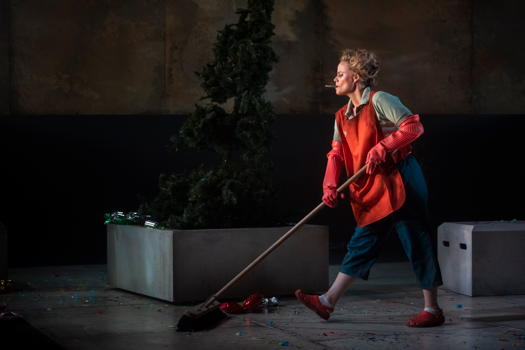
An unlikely Destiny - Lizzie Holmes with omnipresent cigarette. Photo © 2019 Matthew Williams-Ellis
Yet for me, mostly, the delight remained. Jean Chan engaged some costuming ideas that were irritatingly yet joyously relevant: the hyperactive, lovelorn Pan (tenor James Gribble) in prominent horns; his self-opinionated satyr lackey, similarly horned Satirino (Gabriel Seawright) - nicely described as 'a pubescent (?) rake eager to have sex with the nymph Linfea', or likewise 'the epitome of the carnal'; and possibly the biggest hoot of the staging, William Stevens as Sylvano, a kind of static also-ran amongst Pan's retinue. A bizarre but hilarious array of foliage enclosed him almost completely; dark-glassed also, he looked relishably ridiculous, but strangely dignified too: a kind of honourable adjunct to his counterpart, the troublemaking Satirino. What's more, Stevens' rich bass, for my money, was one of the most satisfying voices of the evening. And Gribble's yelping tenor Pan was another, especially on his first appearance.
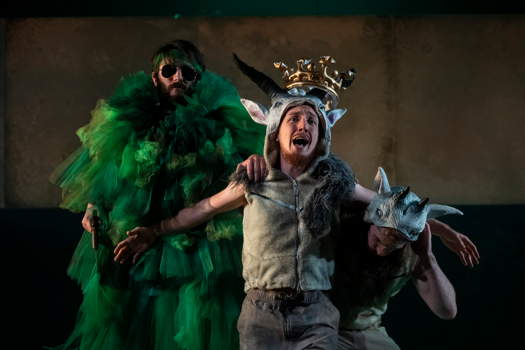
Goat-horned Pan (James Gribble) in a passionate outburst with leafy Sylvano (William Stevens, left) and malicious Saturino (Gabriel Seawright, right). Photo © 2019 Matthew Williams-Ellis
One disastrous, and infuriating, foul-up in the production came at the end, when Jupiter, ceding to his exasperated, jealous, shrill wife Juno, concedes and instead transforms Calisto into a constellation: The Great Bear. (Myth has it that it was Juno who transformed her.) This is what the entire opera has been heading towards. It must be a moment of gorgeous transfiguration - like that of Dafne in Garsington's staging of Strauss's opera. The effect there at the close was truly wondrous: magical. Here, such was Lopéz and Chan's obsession with 'ideas' that Calisto (who has just descended a ladder, for goodness' sake: an opportunity missed) is saddled with a light blue furry bear's head, and stuffed into a supermarket trolley, having earlier been accompanied by a brown, a grey and a panda bears' heads - one of them maybe Ursa Minor? Did the trolleys have some curious significance? Did we miss some symbolic wisdom? Where was that pure magic and mystery of her transfiguration? It was one of the silliest, least perceptive endings of a mythical masterpiece I have witnessed. A waste of what should be a miraculous moment. Oh dear.
The thing that most convincingly countered, and saved, this enterprise was Lesley Anne Sammons' remarkable entourage of instrumentalists. These were, on the face of it, a motley crew: what was an accordion doing in a baroque opera first staged in 1651? Who dreamed up a clarinet in Cavalli (and bass clarinet)? Were the instruments as tatty as the staging? Yet the sounds they generated were thrilling. The impact, thanks to Sammons' competent and perfect leadership, was astonishingly good. Clarinettist Andrew Sparling alternated on a lower recorder, so that added to the treble (or even ripieno?) that gave us a pair of recorders - pure joy - at key stages of the opera. The really sensitive accordion player, Miloš Milivojević, added an astonishing (mainly) lower level to the already alluring textures. At one point he supplied a quite spectacular ground bass. Here was a bold departure that actually worked a treat. La Calisto's music must be beguiling. It certainly was.
Another item which did the job pleasingly was Tim Mitchell's lighting. Mitchell also lit Longborough's Don Giovanni this year, and assisted Ace McCarron - one of the most experienced figures in the field today - on Donizetti's Anna Bolena (Anne Boleyn). Mitchell clearly has a feeling and touch for his art too. Sometimes the stage was bathed in pink, or blue, to bring out some aspect of the opera's charming - or troubling - aspects. Where the production yielded an intensity of emotion, or ribaldry, or poignancy, Mitchell was usually there, picking out some detail, some individual, some moment of crisis or forcefulness. Diana, Mercury, Pan and certainly Calisto benefited from these subtle insights. And so did the audience.
What about the central figures - the warring or masquerading deities, and Calisto herself? Pretty much top of the list was Zita Syme's Giunone (Juno). The Queen of the Gods is infuriated and exhausted by her husband's incessant philandering, but she, jealous and humiliated, has a wife's power and dominance, so that it is she who finally forces Jupiter (Giove) to give up his passion for Calisto. Syme, a former Britten-Pears Young Artist, and winner of the Emmy Destinn Young Singers award, has, for my money, an exciting voice: forceful and domineering - and pained - as suits this particular role of the put-upon spouse, but much more than that. It's a voice rich in colour, so as to contrast the jealous and the repulsed. Her delivery was best of the lot, immensely clear, enunciation spot on, her presence very considerable. She bares her teeth, but earns our sympathy. Clad by Chan in an aggressive, wholly apt searing scarlet, she looked the part too. Her first entry was strong and appealing. I was impressed by her every time she came on stage: one rather wanted more of her.
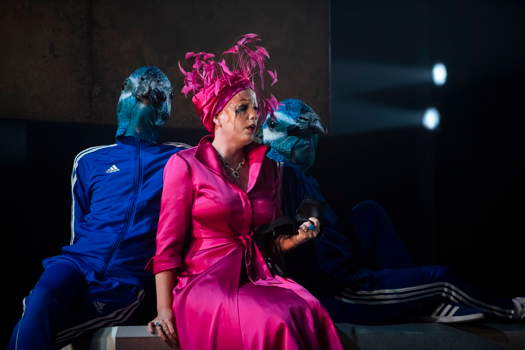
Juno (Zita Syme) and her rather tiresome, high-stepping peacock attendants. Photo © 2019 Matthew Williams-Ellis
Then there was Diana. Thanks to Mercury, Jupiter's slightly unrealistic disguise works - the plot idea conjured up by Cavalli and his librettist, Giovanni Faustini, is entertaining, charming and ingenious in its treatment of Ovidian myth, though sundry cross-dressings, or something akin, surely figure in a host of baroque scores. Faustini supplied Cavalli with some twelve libretti - four others were by Monteverdi's librettist Busenello - and incidentally died in December that same year, just three weeks after La Calisto's premiere, having produced three libretti for Cavalli that year. (Oristeo and Rosinda were the other two; another, Eritrea, was staged in 1652.)
'Diana' benefited from a beefy presence and a voice to match - even if the real Jupiter is as thin as a rake. Sophie Goldrick's singing, too, like Juno's, was forceful, agreeably bracing and firm, though there was a certain mellowness too, and at stages of the opera she could change, to a degree, from one to the other. Goldrick, impressively, has sung for most major UK companies. Was she engaging? Definitely yes; and her amorous cavortings with a lovelorn Calisto - though in theory she rejects it on principle and spurns her fairly mercilessly - were pretty tender. Having set up a (supposedly) female-female love match, the real Jupiter could scarcely be blamed for thinking he's right in there. Actually the randy Diana-Calisto heart-to-heart was the sexiest thing of the evening. It titillated, and very agreeably.
This was mainly because the story of the starry-eyed infatuation of Calisto for 'Diana' - who is herself (in her real guise) obsessed with the shepherd Endymion - was so believably, and heart-rendingly, captured, thanks to Chiara Vinci's touchingly innocent, and rapt, depiction of the unfortunate nymph.
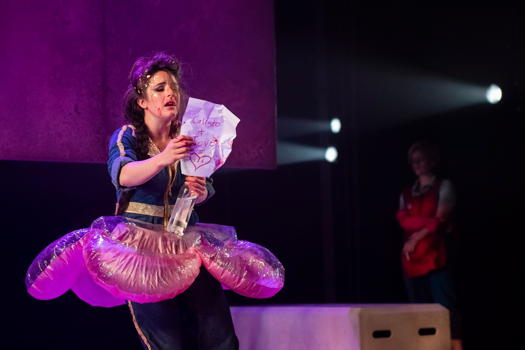
Calisto (Chiara Vinci) dons a more feminine, ballooning costume. Photo © 2019 Matthew Williams-Ellis
Vinci (no slimline herself) has done the round of a large clutch of lesser known companies with curious names, including the wittily titled: WOW! Opera, Barefoot Opera and Loud Crowd - Longborough Artistic Director Polly Graham's new company. Vinci herself is not a case of loud crowd: just as she was desirably tender, so the voice was too. I found everything about her (even that navy and yellow trouser suit - the costume presumably underscoring Diana's ardent followers) rather moving. That's what Calisto has to be. She was visibly shorter than Goldrick's hunting Goddess. It meant she could look up to her, as she patently does. Were the togs designed to suggest the trio's Amazon-like following of the chase? If so, a point well made.
Emma Charles likewise came across well. She too had to do some sweeping, but despite limited appearances she brought to Linfea a cheerfully bossy presence, and some nicely shaped singing too. In fact all three of the broom-ladies made a good sound, when you could hear them - the score - or arrangement - occasionally at fault. Vinci, like Charles, alludes in her CV to Kommilitonen!, Maxwell Davies' final - and searing - last opera, commissioned by the Royal Academy (and Juilliard). Vinci sang Sophie Scholl, the lead role in one part, Die Weisse Rose, a tragic tale of doomed student resistance to Hitler, in Polly Graham's award-laden staging of the opera for Welsh National Youth Opera. Did that suggest recruiting Vinci for LFO? And was Charles, who also mentions Kommilitonen! in her CV, spotted there too?
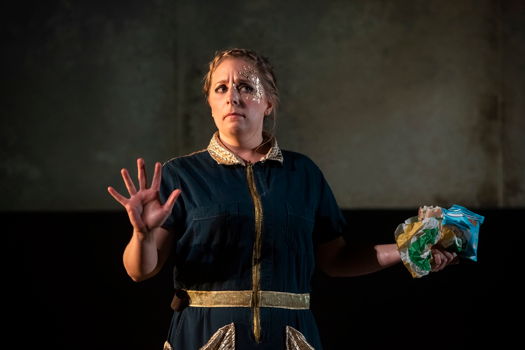
Linfea (Emma Charles), an increasingly unreliable follower of Diana. Photo © 2019 Matthew Williams-Ellis
The Gods came out of this well. Baritone Felix Kemp, beside the normal outlets (Onegin, Don Giovanni) has, creditably, already wandered into (sometimes recording) rare repertoire: Stanford's The Travelling Companion with New Sussex Opera, Odaline de la Martinez' Imoinda, and his own alter ego (ie Felix) in Tom Coult's Violet for Jerwood Opera; and also a key role in Fête Galante, one of Dame Ethel Smyth's almost never heard six operas. He has auditioned successfully for British Youth Opera, Grange Park, Holland Park, English Touring Opera, The Royal Opera (cover) and Wexford. These clearly rate the voice, and they're right to do so. It's firm, attractive, with an appealing timbre, well produced and assured.
He depicted the randy King of the Gods with cheerful aplomb, plotting with his chief lackey but relying on the latter to come up with bright ideas or ingenious wheezes for how he may achieve his goal, and win the girl. You clearly got the feeling - compare Giovanni and Leporello - that this 'amorous' Jupiter was a serial Casanova, an inveterate stud not averse (as here) to rape. His shiny, sparkling, green-grey suit, while not exactly regal, suited the louche character Kemp was quite successfully enacting. But it's Jupiter's rather sweet tones that gave one the most pleasure. He's clearly a find.
In fact Jupiter's role is less active than the hyperactive 'fixer' Mercury, sung by Neil Balfour. He's classed as a bass-baritone, and a buffo role, exuding mischief and fun; and vocally he indicated here that he has quite a wide range. The role is certainly not stuck in the depths. His blue suit was, I suppose, functional. His voice came across to the audience seats strongly, and he gave even what he sang an impish feel, helped by his vocal flexibility. The manipulative duo, Jove and Mercury, interacted well, and their eavesdropping and other antics added to the comic feel.
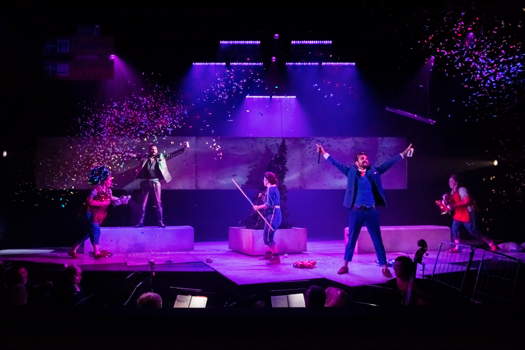
General chaos, generated by Jove (Felix Kemp) and Mercury (Neil Balfour) around Calisto (Chiara Vinci) and cleaners. Photo © 2019 Matthew Williams-Ellis
Even more touching than Calisto herself was the enchanting figure of Endimione (Endymion). Here surely was one of Lopéz and Chan's most felicitous ideas. Northern Irishman Brian McAlea - he has a connection with Nevill Holt Opera, and even covered Don Giovanni for them - turned Endymion into a heartbreakingly distressed figure, a shepherd clad wholly in white - his purity and innocence were obvious - clutching a complete flock of transparent sheep balloons, which serve as his solace as he espouses abstinence, and cannot be won over by Diana - who does indeed, despite her vows, fall for him.
It has been said that 'Cavalli clearly intended Endymion to be the central figure of the opera'. He has a good deal of the most beautiful music. He's touchingly shy and sleepy, as Endymion according to myth traditionally is. (A common proverb declares 'to sleep the sleep of Endymion'.) A patent no-hoper, and - with a lovely, tender voice to boot - this shepherd drew us irresistibly in to his unresolvable emotional crisis. So enchanting was this figure, aching and yearning, it was impossible not to feel utterly sympathetic towards him. He is a figure of male innocence, just as Calisto is of female. McAlea fabulously caught all of this, in a performance of endearing poignancy. And when, now turned pink, he was entangled in cord by the leering, unfeeling Pan and his malicious chum Satirino, we wept for him.
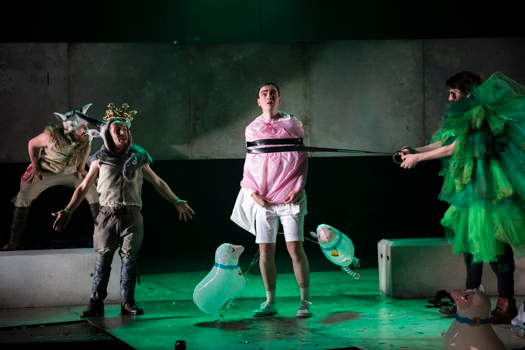
Endymion (Brian McAlea) trapped by Pan and his henchmen, still clutching his balloon sheep. Photo © 2019 Matthew Williams-Ellis
So what's the verdict on La Calisto? The danger of scattering sporadic ideas across any staging is widely recognised, yet because the zaniness was consistent, it to some degree justified itself. To some extent, the failure to invent an appropriate apotheosis - or metamorphosis - at the close, and indeed this one was breathtakingly inappropriate and inept, cast a shadow over all that preceded. Even David Freeman's staging for Opera Factory wasn't as off-beam as this.
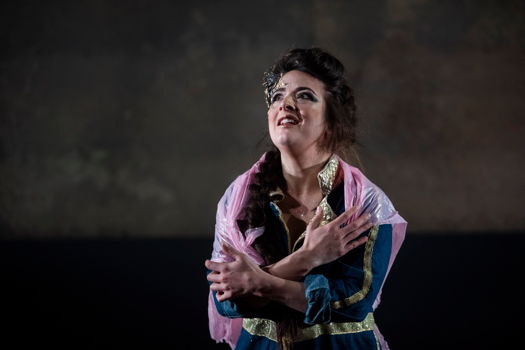
The enraptured Calisto (Chiara Vinci). Photo © 2019 Matthew Williams-Ellis
Yet there was a lot of fun, surely apt for this opera; the best production jests were wholly palatable; the music excellent; and the willingness of Longborough to embark on the daring - its Midsummer Night's Dream had something of this fanciful demeanour - and not hide from less familiar repertoire such as this has to be welcomed. The auditorium was full: in many respects a success, therefore.
Copyright © 12 August 2019
Roderic Dunnett,
Coventry UK



